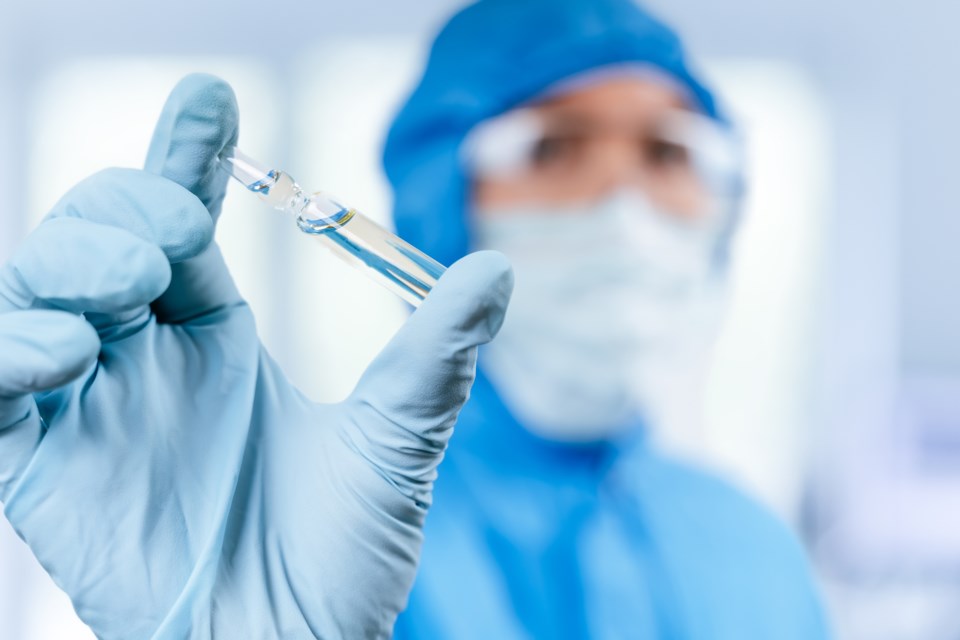Shots, shots, shots everybody - COVID-19 vaccines have officially made it to the north.
The vaccination campaign in the Northern Health Region has begun slowly, with 28 people within the Northern Health Region (NHR) receiving the first dose of the Moderna COVID-19 vaccine. As of Jan. 7, 6,026 people in Manitoba have received their first doses.
The NHR has the lowest rate of vaccinations of the five Manitoba health regions as of Jan. 7 - if vaccinations continue at the rate of 28 doses a day, it will take over seven years to vaccinate everybody in the region - but that number is anticipated to pick up once eligibility criteria opens up, more appointments are made and supplies of vaccines increase.
As of Jan. 7, COVID-19 vaccine eligibility is restricted to people who work in critical care units, people over age 45 who work in long-term care facilities or acute care and people of any age working at COVID-19 vaccine clinics, COVID-19 laboratory facilities, COVID-19 hospital wards and provincial or federal correctional centres.
Manitoba's government has opened what it calls a vaccine "super site" at the RBC Convention Centre in Winnipeg and plans to open up hub facilities for vaccines in Brandon and Thompson. The site in Brandon is anticipated to open Jan. 18, while the Thompson site will open Feb. 1. The province has hired 750 people to administer the vaccines, manage clinics, observe people after the shots and for other tasks - no employees appear to be hired yet to staff the Thompson site as of Jan. 7, but the province plans to begin staffing that site in the coming weeks.
It is unclear when COVID-19 vaccines will be made available for eligible workers and residents in Flin Flon or if the community will host its own immunization clinic in the near future.
Manitoba has received thousands of doses of both the Pfizer-BioNTech vaccine and Moderna vaccine - 22,230 of the Pfizer-BioNTech and 7,300 doses of the Moderna as of Jan. 7 - but the vaccine being brought north will be the Moderna vaccine. The vaccine, which is rated as about 94 per cent effective at preventing COVID-19 as of two weeks after the first dose, requires less resources to ship, not requiring the same super-cold storage the Pfizer-BioNTech vaccine does. The Moderna vaccine must be stored at around minus-20 degrees Celsius before use to remain viable.
Of the 7,300 doses of the Moderna vaccine sent to Manitoba, 5,300 have been earmarked for First Nation communities. Those doses have been set aside for people working in essential health care, people living in personal care and elder care homes, people over age 60 in remote communities and people over age 70 in non-remote communities.
According to the Assembly of Manitoba Chiefs - who have been tasked by the provincial government to assist in getting the vaccines to remote communities - vaccines have been shipped to four Indigenous communities - Cross Lake, Norway House, Peguis First Nation and Fisher River. Doses will be distributed to five other sites - Nelson House/Nisichawayasihk, Opaskwayak Cree Nation, Sagkeeng, Sioux Valley and Oxford House/Bunibonibee - later this month.
"We are working with federal, provincial and First Nation organizational partners on the extensive logistic details that the distribution requires, which may include charter airplanes, helicopters and/or hovercrafts," reads an AMC statement.
The rest of the Moderna doses will be used to kickstart an immunization campaign for care homes across the province, including at Northern Lights Manor in Flin Flon. First doses for manor residents are expected to be given Jan. 21, with second doses scheduled for Feb. 18.




